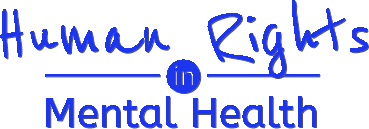
by Beth Ayers, Family Peer Support Lead
December 19, 2023
When I began this article, I was going to write about involuntary commitment, in particular for young adult children by their parents. But after spending hours writing and talking to others, I was more confused than when I started. I was left with more questions than answers. And maybe that’s how it should be. Maybe we should wrestle with it. Maybe there is no right or wrong stance but many answers that depend on numerous variables.
 As I was looking up human rights and mental health, involuntary commitment was listed as a human rights violation by the World Health Organization (WHO). But more of the article by WHO, titled Mental Health: Promoting & Protecting Human Rights, was about a person’s right to “available, accessible, acceptable, and good quality care; and the right to liberty, independence, and inclusion in the community.” The article also stated that “lack of community-based services means the main setting for mental health care is long-stay psychiatric hospitals or institutions.” And it got me thinking that instead of writing about this complex, complicated, and emotional topic of involuntary commitment maybe I should focus upstream on prevention so that maybe fewer situations for involuntary commitment arise.
As I was looking up human rights and mental health, involuntary commitment was listed as a human rights violation by the World Health Organization (WHO). But more of the article by WHO, titled Mental Health: Promoting & Protecting Human Rights, was about a person’s right to “available, accessible, acceptable, and good quality care; and the right to liberty, independence, and inclusion in the community.” The article also stated that “lack of community-based services means the main setting for mental health care is long-stay psychiatric hospitals or institutions.” And it got me thinking that instead of writing about this complex, complicated, and emotional topic of involuntary commitment maybe I should focus upstream on prevention so that maybe fewer situations for involuntary commitment arise.
An online article by Mental Health America (MHA), titled Mental Health Rights, expanded on these rights of liberty and autonomy, community inclusion, and access to services. It states that persons with mental health and substance use conditions “have the right to make decisions about their lives, including their treatment.” This tells me that my adult child with a mental health condition has a right to see a counselor or not; take medication or not; want recovery or not. As a parent that is sometimes a hard pill to swallow. I want the best for my child, but maybe what I think is best for them actually isn’t. I believe everyone deserves the dignity and respect to make their own choices. I wouldn’t be the person I am today without the struggles and lessons learned by my consequences and successes. But then I think about if my child was in psychosis and mentally unwell to the point that they had lost the ability to make decisions. Well, who determines what well or unwell is? Who determines if my child should be involuntarily committed? And do I trust this person? See, I told you I had more questions than answers. However, a preventative measure a person with a mental health and substance use condition can take is having an Advanced Psychiatric Directive. MHA, in the same article, explains that with an Advanced Psychiatric Directive the person can “designate in writing, while competent, what treatments they should receive should their decisional capacity be impaired at a later date.”
Community inclusion. MHA writes, “People living with mental health conditions have the right to live and fully participate in their communities of choice.” As a parent of a child with a mental health condition, I have firsthand experience with stigma and exclusion. I have had to fight for my child’s condition to be looked at for what it is, a physical condition and not laziness or their choice or bad parenting. As a Family Peer Supporter, I have worked with many families whose children have been kicked out of daycares and schools because of their mental health conditions and the behaviors that can come with it. The article takes this further saying, “Community inclusion means not only addressing discriminatory practices that exist but also providing necessary supports that allow people to live and find meaningful roles in their communities.” One way to combat community exclusion is through education. When people know better, they do better. Understanding mental illness breaks down the stigma and helps the community feel comfortable interacting with people with mental health conditions. We can also tell our stories. Putting a human face to mental illness breaks down walls and helps communities find their common humanity. Peer support is another great way to empower other peers and advocate for inclusion.
Access to services. The above-mentioned article address this by saying, “People living with mental health conditions have the right to receive the services they want, how and where they want them.” While I agree with this statement wholeheartedly, I also realize the many challenges that make this hard, if not impossible. Lack of community-based services, rural landscapes, insurance, systems, and a lack of providers all limit access to services. The increased use of telehealth has helped providers see and treat patients from hundreds of miles away, increasing access to care for rural communities. I have experienced the frustration of trying to get services for my child. The behavioral health system, in my experience, uses a reactive approach to treatment rather than a proactive one. I remember trying to get my child into a partial hospitalization program. Due to insurance approvals and the way access to treatment worked, my child had to go into crisis, be admitted to the in-patient psychiatric center, and then they could be accepted into the partial hospitalization program. I was told that we needed to prove that my child “really needed” the service. As an advocate, I can contact legislators, get in front of people who make the decisions, and sit on advisory councils to change these systems. Even as I do all of this, I have found the most effective method for change has been partnering with service providers and organizations in my community and connecting families to these services. I am fortunate that as a Family Peer Supporter, I have the opportunity daily to connect with families. Data has shown us that when a parent feels heard and validated, their perception of care positively increases as does their confidence in taking care of their child and advocating for their needs. Using our lived experiences brings light to these challenges and moves people towards change.
As a Family Peer Supporter and mental health advocate, I can help protect the rights of people with a mental health condition through my voice, actions, and compassionate support. And I will continue to wrestle with the tougher questions surrounding mental health and human rights, dialogue and listen to people’s point of view and life experiences, and connect to our shared humanity.

